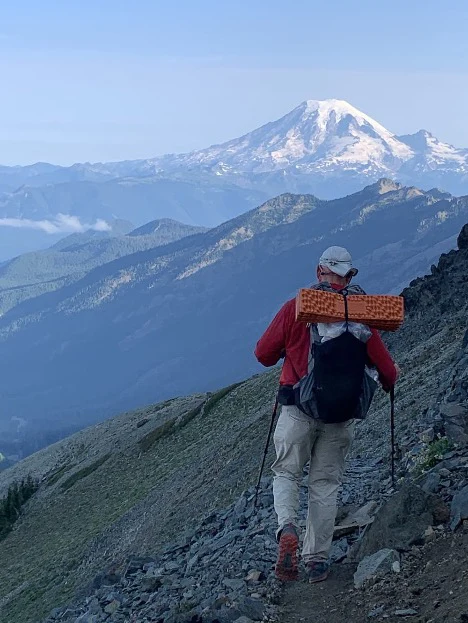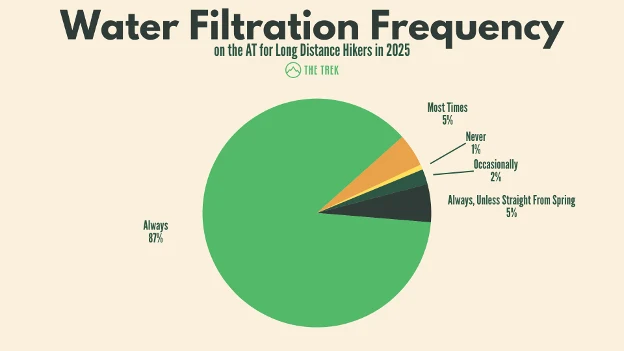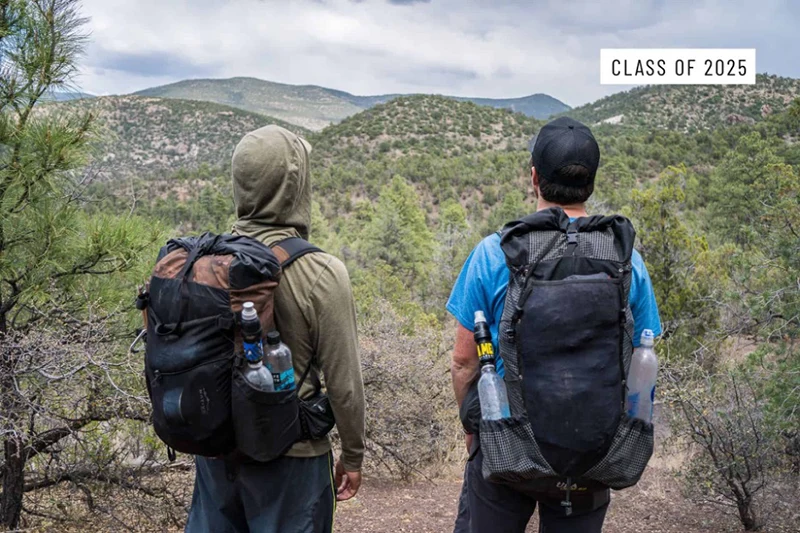Bhutan: The Hidden Kingdom in the Himalayas
Bhutan: The Hidden Kingdom in the Himalayas
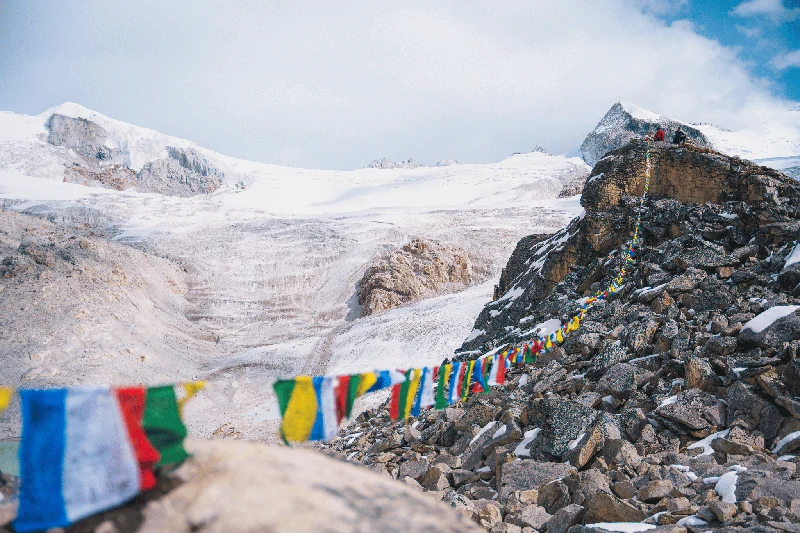
Bhutan: The Hidden Kingdom in the Himalayas
YouTube video highlight
Spanning 200+ miles over nearly three weeks, the Snowman Trek is known to be one of the world’s toughest hikes - and Kendra is taking it on.
Read more about the projectNestled in the heart of the Eastern Himalayas, Bhutan is a small landlocked kingdom tucked between China and India.
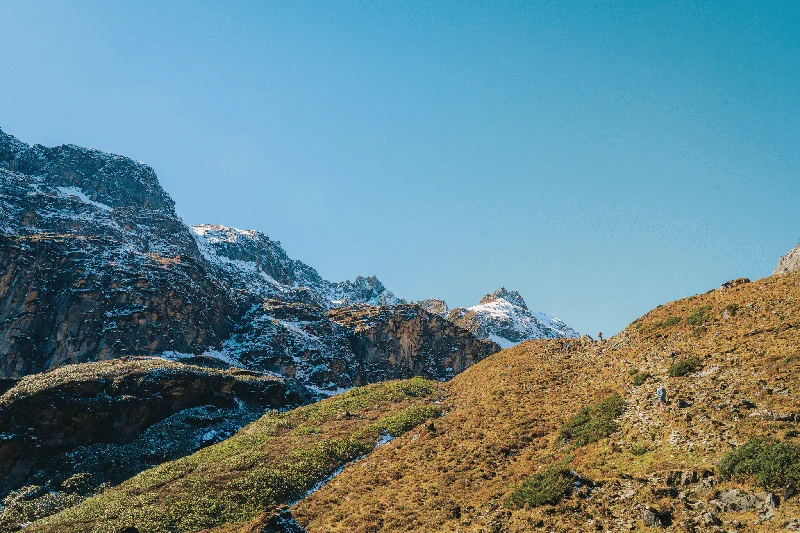
With a population of approximately 884,546 people, it remains one of the world’s most enigmatic nations—a place where ancient traditions seamlessly coexist with modern governance. Bhutan is a constitutional monarchy, led by King Jigme Khesar Namgyel Wangchuck, and is renowned for its commitment to environmental preservation, Gross National Happiness, and carbon negativity.
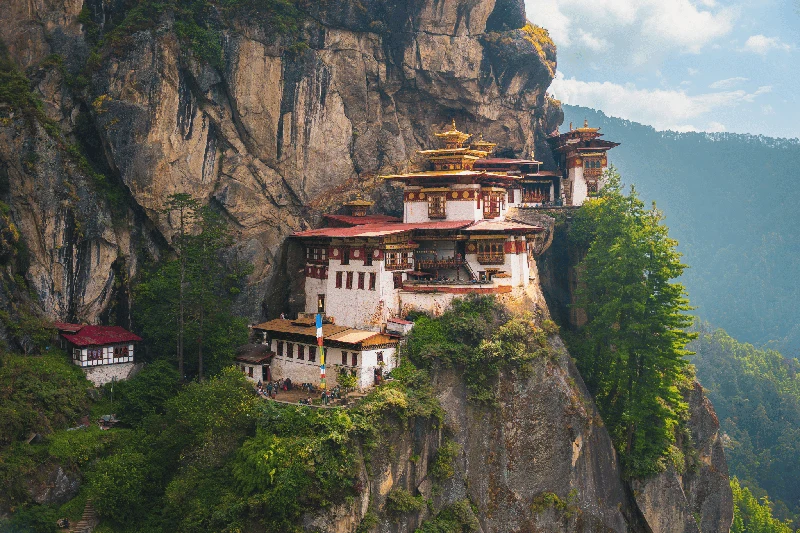
This reverence for nature isn’t just a philosophy—it shapes the very landscape itself.
Nearly 72% of Bhutan remains forested, protecting its rich biodiversity and ensuring that visitors experience a country where the air is crisp, the rivers run pure, and the mountains stand untouched. Yet despite its efforts to safeguard the environment, Bhutan is not immune to the forces reshaping our planet. Nowhere is this more evident than on the Snowman Trek, a journey through one of the most remote and fragile ecosystems in the world.
The Snowman Trek: A Journey Through Bhutan’s Wilderness
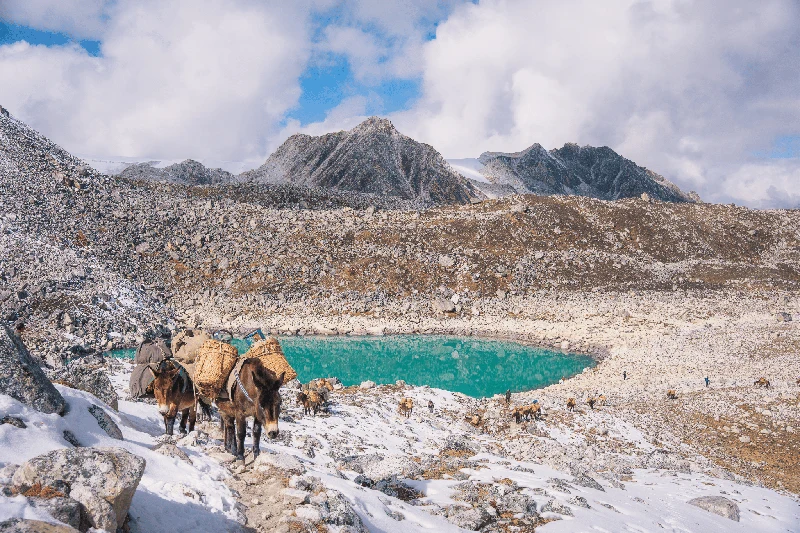
The Snowman Trek is a kind of adventure that settles in slowly—the moment the hum of cities disappears behind you, replaced by the sound of your own breath and the rhythmic crunch of boots on earth. The air is thin, the valleys wide, and the world feels ancient. Here, on the Snowman Trek, the pace of life shifts. It has to.
You walk because there’s no other way forward—no roads, no shortcuts—just winding trails carved into the bones of the Himalayas.
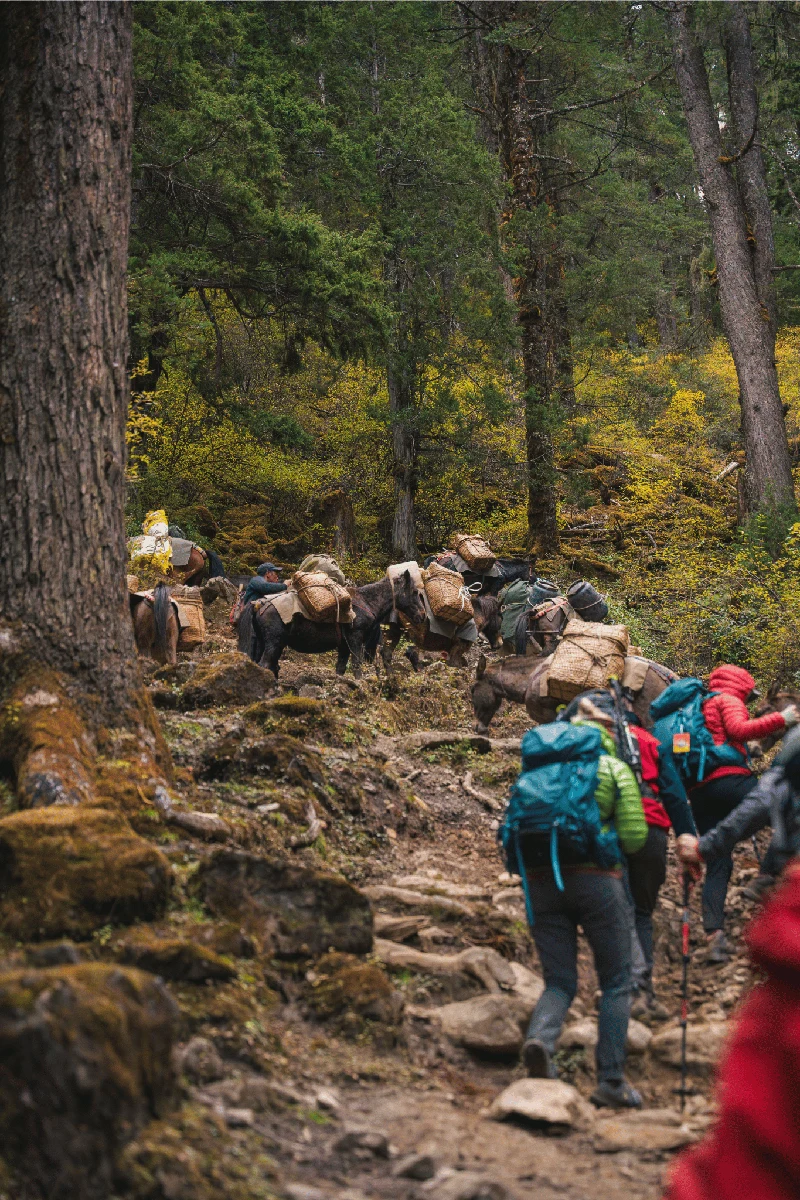
Spanning 200+ miles over nearly three weeks, the Snowman Trek is known to be one of the world’s toughest hikes. It leads trekkers through 11 high-altitude passes, climbs beyond 5,230 meters (17,160 ft), and threads through remote villages where time moves differently. The trail pulls you higher each day—past fields of grazing yaks, through forests that smell of pine and wet earth, and into the open quiet of alpine wilderness.
But it’s not just a test of endurance—it’s a passage into a world untouched by time, where nature dictates the rhythm of each step.
To walk the Snowman Trek is to surrender to the raw beauty of the Himalayas, to feel both infinitely small and deeply connected to the land.
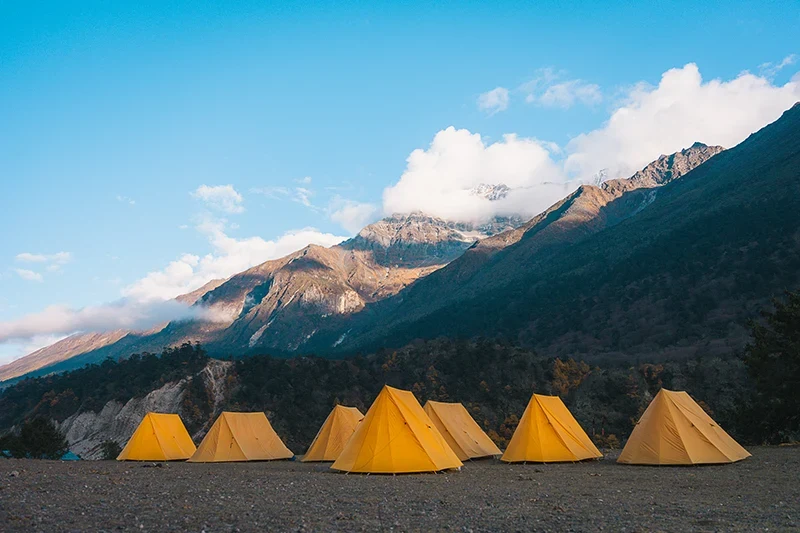
Ascending Into the Silence
By day two, we were already above the tree line. The trail had grown steeper, rockier. The forest behind us gave way to wind-swept ridges and open sky. As we climbed, the clouds thinned and the silence deepened. It wasn’t an empty silence, but one that buzzed with life: the occasional call of a crow overhead, the distant creak of shifting ice, the whisper of wind through prayer flags.
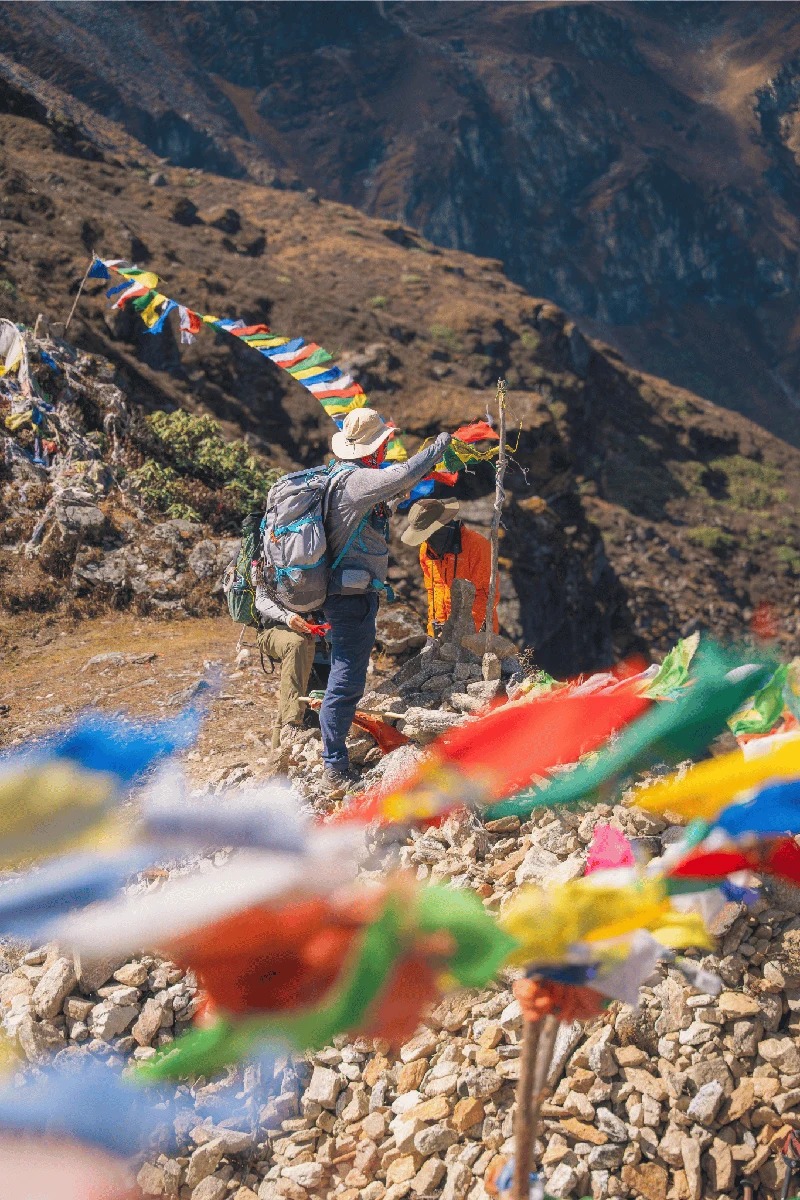
That afternoon, we reached our first high camp at 4,900 meters.
It was perched beside an alpine lake, its surface a surreal shade of turquoise, backdropped by looming glaciers that caught the light like mirrors. We set up our tents in a narrow, wind-sheltered pocket of land. The views were staggering—raw and immense, like standing inside a painting you weren’t meant to touch. For a long while, I just stood there, breathing it all in. My body was tired, but my heart felt wide open.
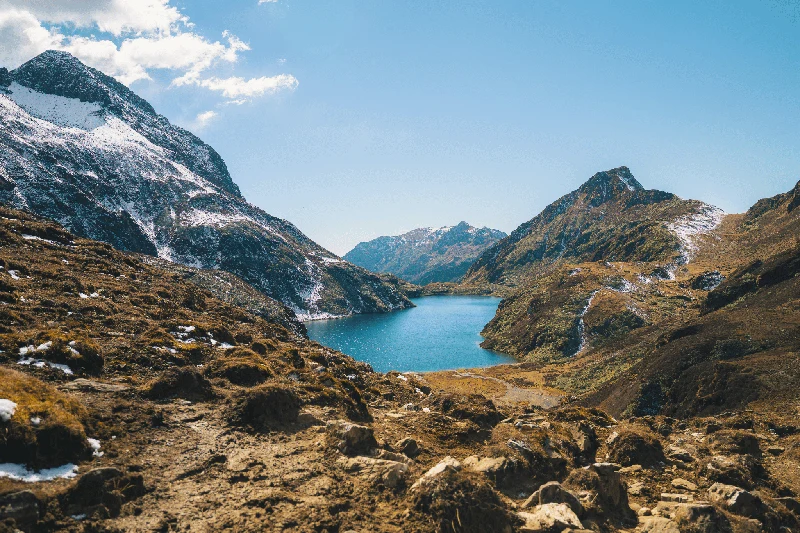
It was one of the most beautiful places I had ever seen.
And then Kinley, my guide, said quietly, “The glaciers are melting.”
I turned to him, surprised. He was still looking at the ice above us.
“The lakes are enlarging,” he said. “They threaten the villages below. What you see now is just a fraction of what used to be.”
Suddenly, the stillness wasn’t peaceful anymore—it was heavy. This place, this otherworldly corner of the planet, was changing right beneath our feet.
Bhutan’s Environmental Ethos
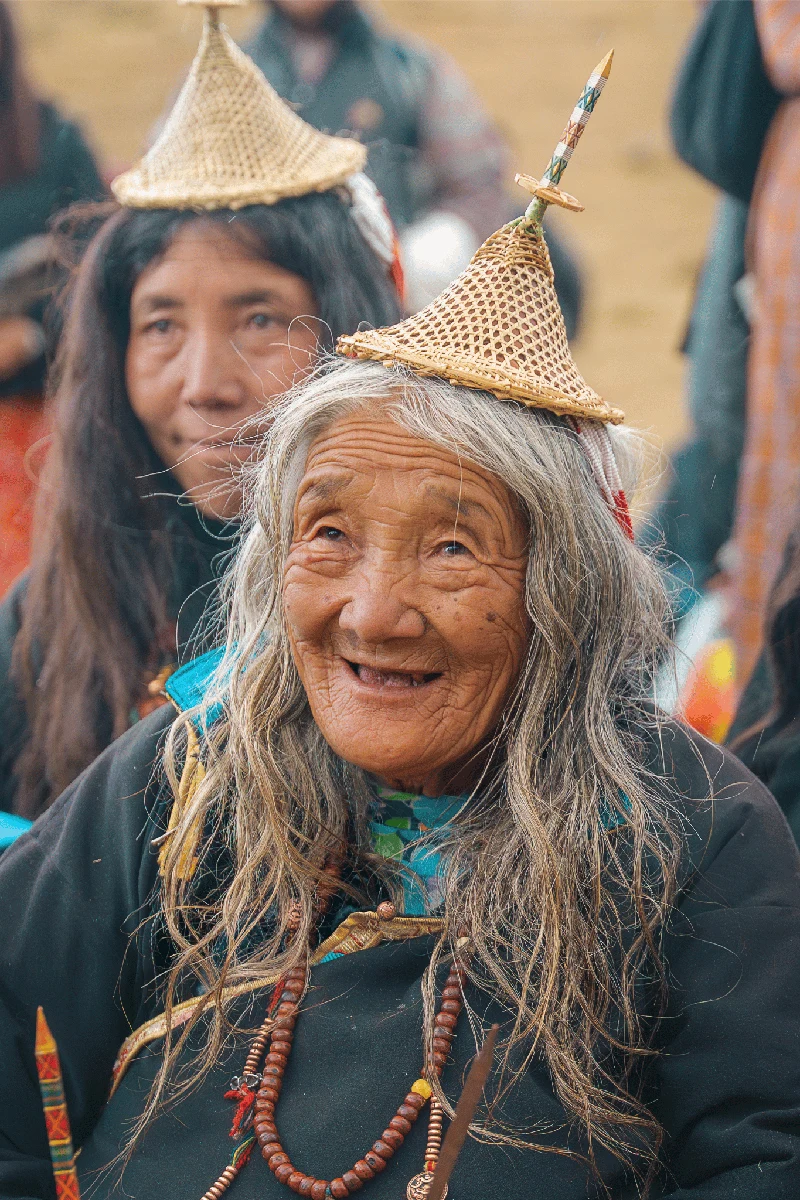
Bhutan is a global beacon of environmental stewardship. It is one of the world’s few carbon-negative countries, absorbing more carbon dioxide than it emits. This achievement is no accident—Bhutan’s government enforces strict environmental policies, ensuring that at least 72% of its land remains forested.
Tourism is heavily regulated to minimize its impact, and trekkers on the Snowman Trek follow routes that avoid summiting peaks. The reason? Reverence for the sacred.
In Bhutanese culture, mountains are living entities, home to spirits and gods. Climbing them is seen as an act of desecration. One of our guides explained, “We don’t summit our highest peaks because we believe in their sanctity. This belief is not only spiritual but also helps us preserve the environment for future generations.”
The Fragility of the Snowman Trek

Despite Bhutan’s incredible efforts, the Snowman Trek is not immune to climate change. Over the past few decades, glaciers along the trail have receded dramatically, leaving once snow-covered peaks barren. These “naked mountains,” as Kinley called them, bear the scars of a warming planet.
“The snows are for the mountains like clothes are for humans,” Kinley said. “When we are stripped of our clothes, how do we feel? The same thing has happened here. There is nothing to celebrate about these lakes—they are growing because the glaciers are melting.”
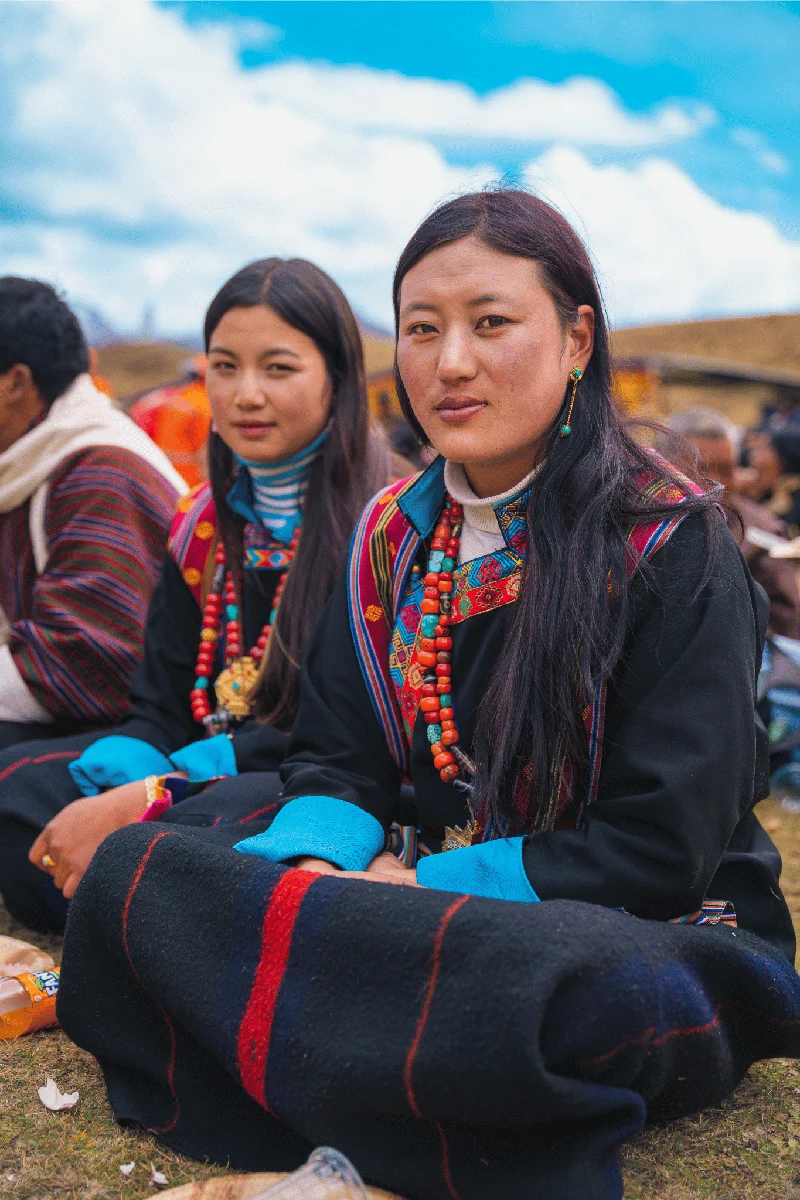
Bhutan’s glaciers are more than frozen rivers; they sustain forests, irrigate crops, and provide drinking water far beyond its borders. Their loss threatens entire ecosystems, accelerates natural disasters, and disrupts lives across South Asia. And once a glacier disappears, it doesn’t return—these ancient ice fields are irreplaceable.

But beyond their physical importance, glaciers are sacred in Bhutanese cosmology—abodes of deities and guardians of the land. Their retreat feels like more than an environmental loss; it’s a spiritual one. The landscape feels quieter in their absence. Emptier.
If we continue on this path, will there be any glaciers left for future generations—not just in Bhutan, but anywhere?
Kinley’s words lingered with me for the rest of the trek. Every glacial lake we passed, every barren slope we climbed, was a stark reminder that even a country as dedicated to conservation as Bhutan is not immune to the forces shaping our planet’s future.
A Call to Action
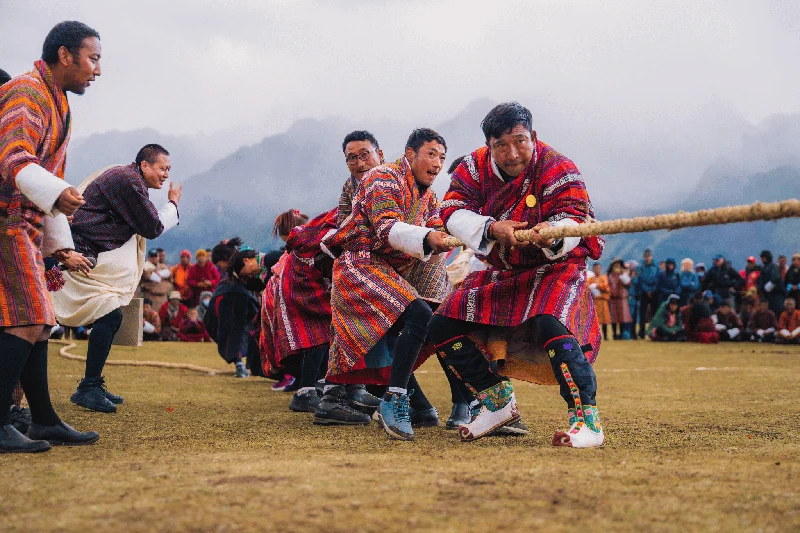
Bhutan’s crisis is not an isolated one—it is a microcosm of a global emergency unfolding in real time. If one of the world’s most conservation-focused nations cannot escape the consequences of climate change, then no place is truly safe. Bhutan is sounding the alarm—not with speeches, but with shrinking glaciers, rising lakes, and sacred mountains shedding their snow.
The question is: are we listening?
We have a choice. We can turn away, lulled into complacency by distance and privilege, or we can recognize Bhutan’s story for what it is—a warning, a call to action. The fate of our planet’s most remote places is a mirror reflecting the health of our collective home.
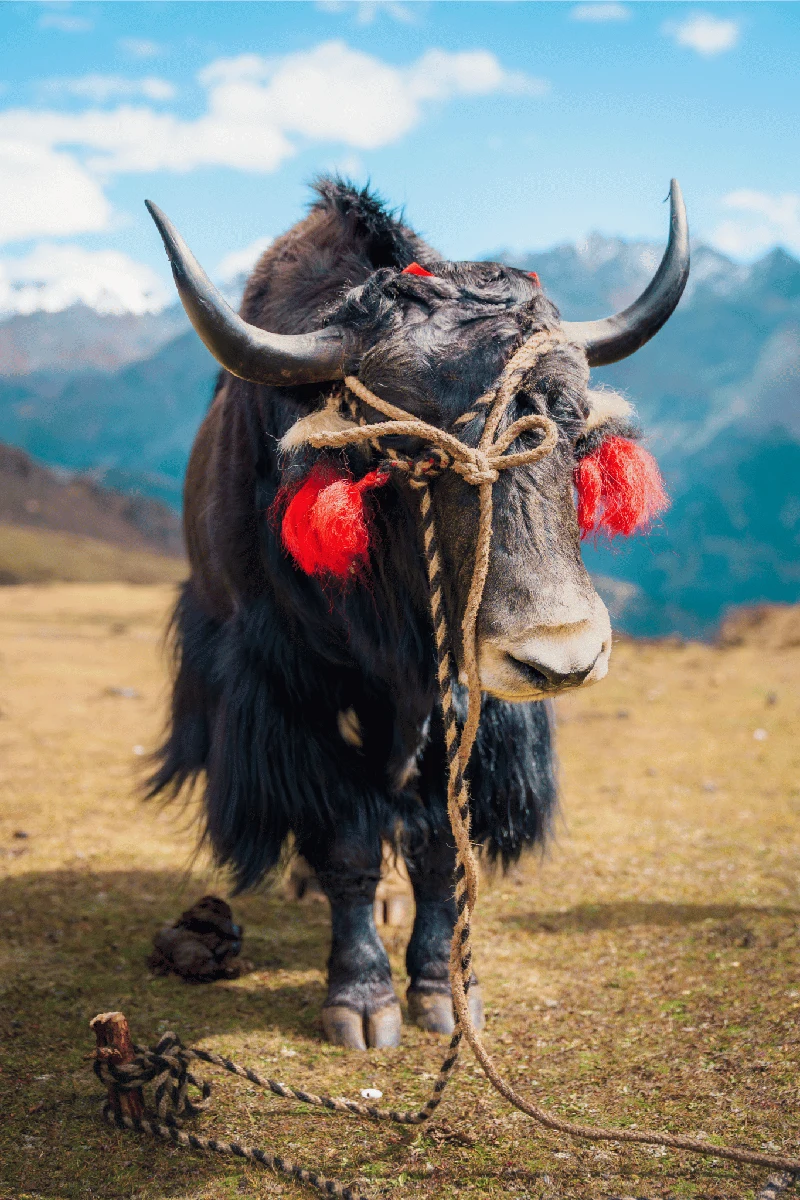
Hiking the Snowman Trek was more than an adventure—it was an awakening. It revealed the fragility of these landscapes and the resilience of those who depend on them. Bhutan has done everything in its power to safeguard its environment, yet even here, the impacts of climate change are inescapable.
As I left the trail, I couldn’t shake the thought: If Bhutan, with its reverence for nature and commitment to sustainability, cannot withstand the changes sweeping across our planet, what hope do we have?
It’s a sobering question—one that underscores the reality that protecting our planet is not just Bhutan’s responsibility. It’s all of ours.
Bhutan: The Hidden Kingdom in the Himalayas


Nestled in the heart of the Eastern Himalayas, Bhutan is a small landlocked kingdom tucked between China and India.

With a population of approximately 884,546 people, it remains one of the world’s most enigmatic nations—a place where ancient traditions seamlessly coexist with modern governance. Bhutan is a constitutional monarchy, led by King Jigme Khesar Namgyel Wangchuck, and is renowned for its commitment to environmental preservation, Gross National Happiness, and carbon negativity.

This reverence for nature isn’t just a philosophy—it shapes the very landscape itself.
Nearly 72% of Bhutan remains forested, protecting its rich biodiversity and ensuring that visitors experience a country where the air is crisp, the rivers run pure, and the mountains stand untouched. Yet despite its efforts to safeguard the environment, Bhutan is not immune to the forces reshaping our planet. Nowhere is this more evident than on the Snowman Trek, a journey through one of the most remote and fragile ecosystems in the world.
The Snowman Trek: A Journey Through Bhutan’s Wilderness

The Snowman Trek is a kind of adventure that settles in slowly—the moment the hum of cities disappears behind you, replaced by the sound of your own breath and the rhythmic crunch of boots on earth. The air is thin, the valleys wide, and the world feels ancient. Here, on the Snowman Trek, the pace of life shifts. It has to.
You walk because there’s no other way forward—no roads, no shortcuts—just winding trails carved into the bones of the Himalayas.

Spanning 200+ miles over nearly three weeks, the Snowman Trek is known to be one of the world’s toughest hikes. It leads trekkers through 11 high-altitude passes, climbs beyond 5,230 meters (17,160 ft), and threads through remote villages where time moves differently. The trail pulls you higher each day—past fields of grazing yaks, through forests that smell of pine and wet earth, and into the open quiet of alpine wilderness.
But it’s not just a test of endurance—it’s a passage into a world untouched by time, where nature dictates the rhythm of each step.
To walk the Snowman Trek is to surrender to the raw beauty of the Himalayas, to feel both infinitely small and deeply connected to the land.

Ascending Into the Silence
By day two, we were already above the tree line. The trail had grown steeper, rockier. The forest behind us gave way to wind-swept ridges and open sky. As we climbed, the clouds thinned and the silence deepened. It wasn’t an empty silence, but one that buzzed with life: the occasional call of a crow overhead, the distant creak of shifting ice, the whisper of wind through prayer flags.

That afternoon, we reached our first high camp at 4,900 meters.
It was perched beside an alpine lake, its surface a surreal shade of turquoise, backdropped by looming glaciers that caught the light like mirrors. We set up our tents in a narrow, wind-sheltered pocket of land. The views were staggering—raw and immense, like standing inside a painting you weren’t meant to touch. For a long while, I just stood there, breathing it all in. My body was tired, but my heart felt wide open.

It was one of the most beautiful places I had ever seen.
And then Kinley, my guide, said quietly, “The glaciers are melting.”
I turned to him, surprised. He was still looking at the ice above us.
“The lakes are enlarging,” he said. “They threaten the villages below. What you see now is just a fraction of what used to be.”
Suddenly, the stillness wasn’t peaceful anymore—it was heavy. This place, this otherworldly corner of the planet, was changing right beneath our feet.
Bhutan’s Environmental Ethos

Bhutan is a global beacon of environmental stewardship. It is one of the world’s few carbon-negative countries, absorbing more carbon dioxide than it emits. This achievement is no accident—Bhutan’s government enforces strict environmental policies, ensuring that at least 72% of its land remains forested.
Tourism is heavily regulated to minimize its impact, and trekkers on the Snowman Trek follow routes that avoid summiting peaks. The reason? Reverence for the sacred.
In Bhutanese culture, mountains are living entities, home to spirits and gods. Climbing them is seen as an act of desecration. One of our guides explained, “We don’t summit our highest peaks because we believe in their sanctity. This belief is not only spiritual but also helps us preserve the environment for future generations.”
The Fragility of the Snowman Trek

Despite Bhutan’s incredible efforts, the Snowman Trek is not immune to climate change. Over the past few decades, glaciers along the trail have receded dramatically, leaving once snow-covered peaks barren. These “naked mountains,” as Kinley called them, bear the scars of a warming planet.
“The snows are for the mountains like clothes are for humans,” Kinley said. “When we are stripped of our clothes, how do we feel? The same thing has happened here. There is nothing to celebrate about these lakes—they are growing because the glaciers are melting.”

Bhutan’s glaciers are more than frozen rivers; they sustain forests, irrigate crops, and provide drinking water far beyond its borders. Their loss threatens entire ecosystems, accelerates natural disasters, and disrupts lives across South Asia. And once a glacier disappears, it doesn’t return—these ancient ice fields are irreplaceable.

But beyond their physical importance, glaciers are sacred in Bhutanese cosmology—abodes of deities and guardians of the land. Their retreat feels like more than an environmental loss; it’s a spiritual one. The landscape feels quieter in their absence. Emptier.
If we continue on this path, will there be any glaciers left for future generations—not just in Bhutan, but anywhere?
Kinley’s words lingered with me for the rest of the trek. Every glacial lake we passed, every barren slope we climbed, was a stark reminder that even a country as dedicated to conservation as Bhutan is not immune to the forces shaping our planet’s future.
A Call to Action

Bhutan’s crisis is not an isolated one—it is a microcosm of a global emergency unfolding in real time. If one of the world’s most conservation-focused nations cannot escape the consequences of climate change, then no place is truly safe. Bhutan is sounding the alarm—not with speeches, but with shrinking glaciers, rising lakes, and sacred mountains shedding their snow.
The question is: are we listening?
We have a choice. We can turn away, lulled into complacency by distance and privilege, or we can recognize Bhutan’s story for what it is—a warning, a call to action. The fate of our planet’s most remote places is a mirror reflecting the health of our collective home.

Hiking the Snowman Trek was more than an adventure—it was an awakening. It revealed the fragility of these landscapes and the resilience of those who depend on them. Bhutan has done everything in its power to safeguard its environment, yet even here, the impacts of climate change are inescapable.
As I left the trail, I couldn’t shake the thought: If Bhutan, with its reverence for nature and commitment to sustainability, cannot withstand the changes sweeping across our planet, what hope do we have?
It’s a sobering question—one that underscores the reality that protecting our planet is not just Bhutan’s responsibility. It’s all of ours.
Bhutan: The Hidden Kingdom in the Himalayas


Nestled in the heart of the Eastern Himalayas, Bhutan is a small landlocked kingdom tucked between China and India.

With a population of approximately 884,546 people, it remains one of the world’s most enigmatic nations—a place where ancient traditions seamlessly coexist with modern governance. Bhutan is a constitutional monarchy, led by King Jigme Khesar Namgyel Wangchuck, and is renowned for its commitment to environmental preservation, Gross National Happiness, and carbon negativity.

This reverence for nature isn’t just a philosophy—it shapes the very landscape itself.
Nearly 72% of Bhutan remains forested, protecting its rich biodiversity and ensuring that visitors experience a country where the air is crisp, the rivers run pure, and the mountains stand untouched. Yet despite its efforts to safeguard the environment, Bhutan is not immune to the forces reshaping our planet. Nowhere is this more evident than on the Snowman Trek, a journey through one of the most remote and fragile ecosystems in the world.
The Snowman Trek: A Journey Through Bhutan’s Wilderness

The Snowman Trek is a kind of adventure that settles in slowly—the moment the hum of cities disappears behind you, replaced by the sound of your own breath and the rhythmic crunch of boots on earth. The air is thin, the valleys wide, and the world feels ancient. Here, on the Snowman Trek, the pace of life shifts. It has to.
You walk because there’s no other way forward—no roads, no shortcuts—just winding trails carved into the bones of the Himalayas.

Spanning 200+ miles over nearly three weeks, the Snowman Trek is known to be one of the world’s toughest hikes. It leads trekkers through 11 high-altitude passes, climbs beyond 5,230 meters (17,160 ft), and threads through remote villages where time moves differently. The trail pulls you higher each day—past fields of grazing yaks, through forests that smell of pine and wet earth, and into the open quiet of alpine wilderness.
But it’s not just a test of endurance—it’s a passage into a world untouched by time, where nature dictates the rhythm of each step.
To walk the Snowman Trek is to surrender to the raw beauty of the Himalayas, to feel both infinitely small and deeply connected to the land.

Ascending Into the Silence
By day two, we were already above the tree line. The trail had grown steeper, rockier. The forest behind us gave way to wind-swept ridges and open sky. As we climbed, the clouds thinned and the silence deepened. It wasn’t an empty silence, but one that buzzed with life: the occasional call of a crow overhead, the distant creak of shifting ice, the whisper of wind through prayer flags.

That afternoon, we reached our first high camp at 4,900 meters.
It was perched beside an alpine lake, its surface a surreal shade of turquoise, backdropped by looming glaciers that caught the light like mirrors. We set up our tents in a narrow, wind-sheltered pocket of land. The views were staggering—raw and immense, like standing inside a painting you weren’t meant to touch. For a long while, I just stood there, breathing it all in. My body was tired, but my heart felt wide open.

It was one of the most beautiful places I had ever seen.
And then Kinley, my guide, said quietly, “The glaciers are melting.”
I turned to him, surprised. He was still looking at the ice above us.
“The lakes are enlarging,” he said. “They threaten the villages below. What you see now is just a fraction of what used to be.”
Suddenly, the stillness wasn’t peaceful anymore—it was heavy. This place, this otherworldly corner of the planet, was changing right beneath our feet.
Bhutan’s Environmental Ethos

Bhutan is a global beacon of environmental stewardship. It is one of the world’s few carbon-negative countries, absorbing more carbon dioxide than it emits. This achievement is no accident—Bhutan’s government enforces strict environmental policies, ensuring that at least 72% of its land remains forested.
Tourism is heavily regulated to minimize its impact, and trekkers on the Snowman Trek follow routes that avoid summiting peaks. The reason? Reverence for the sacred.
In Bhutanese culture, mountains are living entities, home to spirits and gods. Climbing them is seen as an act of desecration. One of our guides explained, “We don’t summit our highest peaks because we believe in their sanctity. This belief is not only spiritual but also helps us preserve the environment for future generations.”
The Fragility of the Snowman Trek

Despite Bhutan’s incredible efforts, the Snowman Trek is not immune to climate change. Over the past few decades, glaciers along the trail have receded dramatically, leaving once snow-covered peaks barren. These “naked mountains,” as Kinley called them, bear the scars of a warming planet.
“The snows are for the mountains like clothes are for humans,” Kinley said. “When we are stripped of our clothes, how do we feel? The same thing has happened here. There is nothing to celebrate about these lakes—they are growing because the glaciers are melting.”

Bhutan’s glaciers are more than frozen rivers; they sustain forests, irrigate crops, and provide drinking water far beyond its borders. Their loss threatens entire ecosystems, accelerates natural disasters, and disrupts lives across South Asia. And once a glacier disappears, it doesn’t return—these ancient ice fields are irreplaceable.

But beyond their physical importance, glaciers are sacred in Bhutanese cosmology—abodes of deities and guardians of the land. Their retreat feels like more than an environmental loss; it’s a spiritual one. The landscape feels quieter in their absence. Emptier.
If we continue on this path, will there be any glaciers left for future generations—not just in Bhutan, but anywhere?
Kinley’s words lingered with me for the rest of the trek. Every glacial lake we passed, every barren slope we climbed, was a stark reminder that even a country as dedicated to conservation as Bhutan is not immune to the forces shaping our planet’s future.
A Call to Action

Bhutan’s crisis is not an isolated one—it is a microcosm of a global emergency unfolding in real time. If one of the world’s most conservation-focused nations cannot escape the consequences of climate change, then no place is truly safe. Bhutan is sounding the alarm—not with speeches, but with shrinking glaciers, rising lakes, and sacred mountains shedding their snow.
The question is: are we listening?
We have a choice. We can turn away, lulled into complacency by distance and privilege, or we can recognize Bhutan’s story for what it is—a warning, a call to action. The fate of our planet’s most remote places is a mirror reflecting the health of our collective home.

Hiking the Snowman Trek was more than an adventure—it was an awakening. It revealed the fragility of these landscapes and the resilience of those who depend on them. Bhutan has done everything in its power to safeguard its environment, yet even here, the impacts of climate change are inescapable.
As I left the trail, I couldn’t shake the thought: If Bhutan, with its reverence for nature and commitment to sustainability, cannot withstand the changes sweeping across our planet, what hope do we have?
It’s a sobering question—one that underscores the reality that protecting our planet is not just Bhutan’s responsibility. It’s all of ours.








